YOGA BODY
Praise for
Yoga Body: The Origins of Modern Posture Practice
Mark Singleton
Mark Singletons Yoga Body: The Origins of Modern Posture Practice is an outstanding scholarly work which brings so much insight and clarity to the historic and cultural background of modern ha ha yoga. I highly recommend this book, especially for all sincere students of yoga.John Friend, founder of Anusara Yoga
ha yoga. I highly recommend this book, especially for all sincere students of yoga.John Friend, founder of Anusara Yoga
From the moment I started reading Mark Singletons Yoga Body I couldnt put it down. It is beautifully written, extensively researched, and full of fascinating information. It stands alone in its depth of insight into a subject which has intrigued me for forty years.David Williams, the first non-Indian to learn the complete Ashtanga Yoga syllabus
Mark Singletons book Yoga Body traces the evolution of the ever-expanding practice of  sana world-wide. His work offers a much needed historical perspective that will help correct much of the mythology and group-think that is emerging in the modern
sana world-wide. His work offers a much needed historical perspective that will help correct much of the mythology and group-think that is emerging in the modern  sana based yoga world. Any serious
sana based yoga world. Any serious  sana practitioner who wishes to understand the place of
sana practitioner who wishes to understand the place of  sana in the greater tradition of yoga will do well to read it carefully.Gary Krafstow, founder of the American Viniyoga Institute, author of Yoga for Wellness and Yoga for Transformation
sana in the greater tradition of yoga will do well to read it carefully.Gary Krafstow, founder of the American Viniyoga Institute, author of Yoga for Wellness and Yoga for Transformation
Mark Singleton has written a sweeping and nuanced account of the origins and development of modern postural yoga in early twentieth-century India and the West, arguing convincingly that yoga as we know it today does not flow directly from the Yoga S tras or Indias medieval ha
tras or Indias medieval ha ha yoga traditions, but rather emerged out of a confluence of practices, movements and ideologies, ranging from contortionist acts in carnival sideshows, British Army calisthenics and womens stretching exercises to social Darwinism, eugenics, and the Indian nationalist movement. The richly illustrated story he tells is an especially welcome contribution to the history of yoga, demonstrating the ways in which an ancient tradition was reinvented against the backdrop of Indias colonial experience.David Gordon White, professor of Religious Studies, University of California, Santa Barbara.
ha yoga traditions, but rather emerged out of a confluence of practices, movements and ideologies, ranging from contortionist acts in carnival sideshows, British Army calisthenics and womens stretching exercises to social Darwinism, eugenics, and the Indian nationalist movement. The richly illustrated story he tells is an especially welcome contribution to the history of yoga, demonstrating the ways in which an ancient tradition was reinvented against the backdrop of Indias colonial experience.David Gordon White, professor of Religious Studies, University of California, Santa Barbara.
YOGA BODY
THE ORIGINS OF MODERN POSTURE PRACTICE
MARK SINGLETON


Oxford University Press, Inc., publishes works that further Oxford Universitys objective of excellence in research, scholarship, and education.
Oxford New York
Auckland Cape Town Dar es Salaam Hong Kong Karachi
Kuala Lumpur Madrid Melbourne Mexico City
Nairobi New Delhi Shanghai Taipei Toronto
With offices in
Argentina Austria Brazil Chile Czech Republic France Greece
Guatemala Hungary Italy Japan Poland Portugal Singapore
South Korea Switzerland Thailand Turkey Ukraine Vietnam
Copyright 2010 by Oxford University Press, Inc.
Published by Oxford University Press, Inc.
198 Madison Avenue, New York, NY 10016
www.oup.com
Oxford is a registered trademark of Oxford University Press
All rights reserved. No part of this publication may be reproduced, stored in a retrieval system, or transmitted, in any form or by any means, electronic, mechanical, photocopying, recording, or otherwise, without the prior permission of Oxford University Press.
Library of Congress Cataloging-in-Publication Data
Singleton, Mark, 1972
Yoga body: the origins of modern posture practice / Mark Singleton.
p. cm.
Includes bibliographical references and index.
ISBN 978-0-19-539535-8; ISBN 978-0-19-539534-1 (pbk.)
1. Hatha yoga. 2. Posture. I. Title.
RA781.7.S568 2010
613.7046dc22
2009014275
9 8 7 6 5 4 3 2 1
Printed in the United States of America on acid-free paper
contents
acknowledgments
Many people have contributed to the development of the ideas in this book. I would like to thank Peter Schreiner for his thorough and insightful comments on an earlier version; James Mallinson for helping to clarify certain issues regarding contemporary Indian !ha ha yoga practitioners, and for sharing his images of the murals of the N
ha yoga practitioners, and for sharing his images of the murals of the N tha Mah
tha Mah mandir in Jodhpur; Gudrun Bhnemann for spotting some egregious errors in my Sanskrit diacritics; and Dagmar and Dominik Wujastyk for the discussions on the topic of modern yoga over the last five years. Thanks also to Felicia M. Tomasko, editor of !!!LA Yoga Magazine, for her continued insights into current developments in yoga. Im grateful to Gavin Flood and David Smith, who gave valuable feedback at the Ph.D stage of this project; and to Joseph S. Alter and Kenneth Liberman for their extensive comments and suggestions as OUP readers. Thanks also to Eivind Kahrs of Queens College, Cambridge, for reading and commenting on early drafts, and to Julius Lipner for his guidance on the research process throughout my time at the Faculty of Divinity in Cambridge.
mandir in Jodhpur; Gudrun Bhnemann for spotting some egregious errors in my Sanskrit diacritics; and Dagmar and Dominik Wujastyk for the discussions on the topic of modern yoga over the last five years. Thanks also to Felicia M. Tomasko, editor of !!!LA Yoga Magazine, for her continued insights into current developments in yoga. Im grateful to Gavin Flood and David Smith, who gave valuable feedback at the Ph.D stage of this project; and to Joseph S. Alter and Kenneth Liberman for their extensive comments and suggestions as OUP readers. Thanks also to Eivind Kahrs of Queens College, Cambridge, for reading and commenting on early drafts, and to Julius Lipner for his guidance on the research process throughout my time at the Faculty of Divinity in Cambridge.
I am grateful to the participants at the Modern Yoga Graduate Workshop, organized by Elizabeth De Michelis, Suzanne Newcombe, and me at the Divinity Faculty, University of Cambridge, in April 2006. Ongoing interaction with several of the participants has been invaluable in refining the ideas in this book, and in particular, I thank Elliott Goldberg, who was generous in sharing his reflections on physical culture and yoga both prior to and during this workshop. Thanks are also due to Vivienne Lo and Ronit Yoeli-Tlalim of University College, London, for supporting me through the task of editing a special yoga issue of Asian Medicine, Tradition and Modernity in 2007, and to Jean Marie Byrne of Queensland University, Australia, for her collaboration on our collection of yoga scholarship, Yoga in the Modern World (2008). Editorial work on these projects has given me the opportunity to engage in sustained dialogue with many international scholars currently working in the field of modern yoga and has contributed greatly to the shape of this book.
I am much obliged to Laura Cooley of the Meem Library, St. Johns College, Santa Fe, for obtaining the many, sometimes obscure, interlibrary loan requests I made during the final stages of this book, and to Paige Roberts of the Babson Library, Springfield College, Massachusetts, for going out of her way to provide material on YMCA physical culture programs in India. Thanks also to senior staff member and scholar of yoga at the YMCA College of Physical Education in Bangalore,  r
r Vasudeva Bh
Vasudeva Bh
Next page
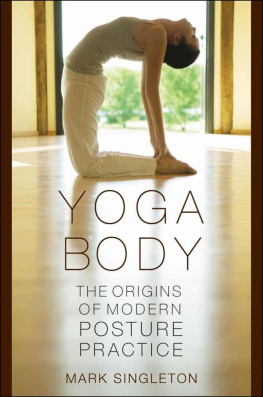
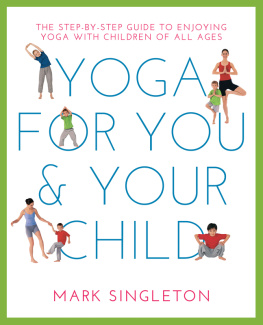
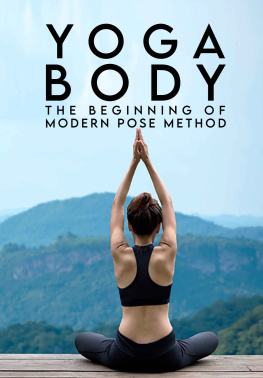

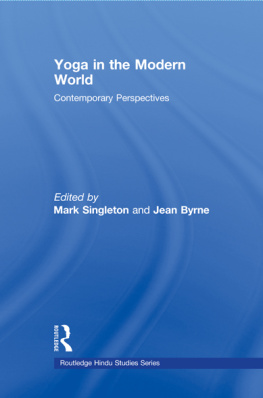
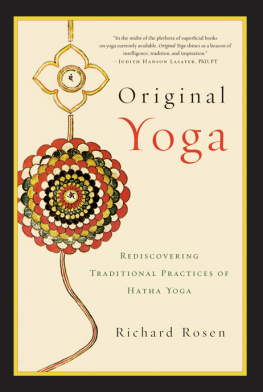
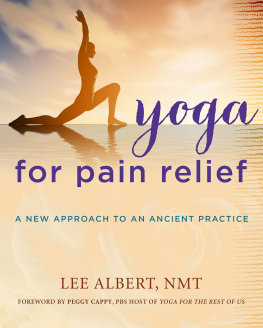
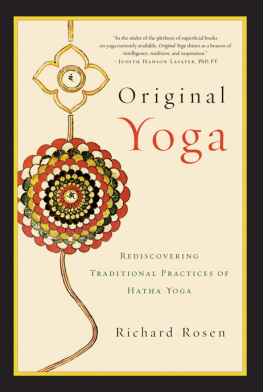
 ha yoga. I highly recommend this book, especially for all sincere students of yoga.John Friend, founder of Anusara Yoga
ha yoga. I highly recommend this book, especially for all sincere students of yoga.John Friend, founder of Anusara Yoga sana world-wide. His work offers a much needed historical perspective that will help correct much of the mythology and group-think that is emerging in the modern
sana world-wide. His work offers a much needed historical perspective that will help correct much of the mythology and group-think that is emerging in the modern  tras or Indias medieval ha
tras or Indias medieval ha

 r
r Vasudeva Bh
Vasudeva Bh